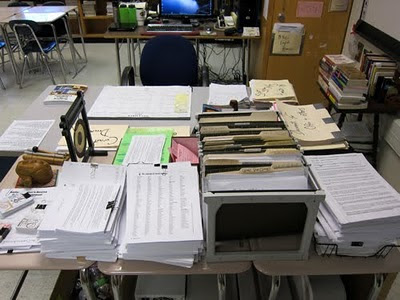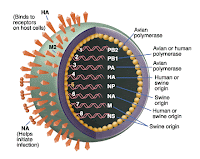 I
I recently picked up
Peter Elbow's "
Writing Without Teachers" because I'm looking to re-ground myself in authentic ideas about the writing process and what actually leads to good writing.
If you stay in K-12 education long enough, there's the chance that your foundational, intrinsic understanding about how meaningful learning occurs will be eroded by bureaucrats who prescribe to have all the right solutions despite lacking the necessary background and/or classroom experience to make such claims.
One of the current popular methods of writing instruction involves showing students models and "exemplars" of writing that meets the highest criteria (usually a set of numbers from a standardized rubric), with the expectation that students - like mimeograph machines - can simply duplicate that product when they're asked to respond to a similar writing prompt.
The problem is that the template for good writing can't be mimicked and reproduced from assignment to assignment, because no such template exists. When students DO try to copy formulae for "good" writing, their writing ends up sounding vapid. That's because quality, authentic writing is
generated, not parroted from nameless "model" papers.
How do we teach students to write? We teach them to think. We teach them to develop content. We help them understand ideas like elaboration and explication. We provide them with opportunities to stretch their minds and flex their intellectual muscles. We give them opportunities to pump out words and ideas without fear of judgement. We teach them how to think critically and make sense of their musings and meanderings. We show them how to tailor and edit and rethink and resee and rearrange. We empower them to be creators.
This type of work is not easy. Years and years of practice are required for most of us to learn how to string words and sentences and paragraphs together in engaging fashion. Before one can write well, one needs to have something to say. Yet sometimes we don't know what we really have to say until we begin writing. When I started this posting, had I already preselected the words and points and contentions I wanted to bring up? No. I knew I wanted to write about how I felt writing instruction in many K-12 schools has become weakened by the advent of formulaic writing and the five paragraph essay. I knew I wanted to get down a few of the techniques that have helped me become a better writer. But I did not use a graphic organizer. I did not make an outline of three main ideas, topic sentences, or supporting details. I simply sat on my couch, kicked my feet up on the coffee table, grabbed my netbook, and attacked the keyboard.
(Once I finished my draft of this post, I went back and read what I wrote, deleted lines, changed words, added phrases, and asked myself,
Is this really what I mean to say? I needed to tweak a number of paragraphs before the final product reflected my intentions. Before I could use the chisel, I needed to have the block.)
Among Peter Elbow's many contributions to writing pedagogy is the spreading of the concept of freewriting. In essence, freewriting encourages writers to lay down ideas without stopping, reflecting, or editing. It proposes to help us "get the junk out" so we can later go back and mine the gems worthy of extraction. Freewriting helps us explore ideas and permits us to open the valve connecting thought and expression. When we no longer feel constricted and restrained, we are more likely to explore greater depths and take risks. Rather than saying what we think we're supposed to say in the manner in which we think we're supposed to say it, we can express genuine ideas in the way those ideas are best meant to be expressed.
Does this mean models and exemplars are bad? Of course not. What it means is that they're a limited resource. They show you what the container looks like, but they don't show you how it was filled. Only through the labor of idea exploration can we learn how to fill those containers. And each container - once filled - will be unique, its appearance and contents determined by the reason for its creation.
Elbow describes this organic process:
"The turning point of the whole cycle of growing is the emergence of a focus or a theme. It is also the most mysterious and difficult kind of cognitive event to analyze. It is the moment when what was chaos is now seen as having a center of gravity. There is shape where a moment ago there was none" (35).
I hope that after finishing Elbow's book (which I am finding to be very affirming and validating about some of my core beliefs about writing), I will have a renewed sense of confidence about how good writing is created, and I will have ideas I can implement in my classroom that will help my students experience what it feels like to create writing that's truly worth reading.
















